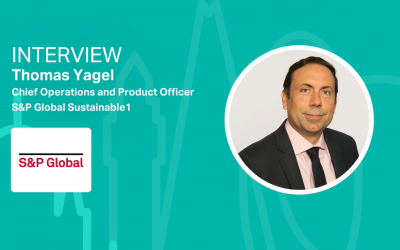Poseidon brings value to nature through carbon blockchain technology
London and New York, 19 September 2017- Today, Laszlo Giricz announced the launch of a partnership to create a carbon currency that will revolutionise the way we value nature, using blockchain technology to access the carbon market.

London and New York, 19 September 2017- Today, Laszlo Giricz, founder of the venture Poseidon, announced the launch of a partnership to create a carbon currency that will revolutionise the way we value nature, using blockchain technology to access the carbon market.
This initiative aims to bring carbon pricing to the mainstream by giving both consumers and corporates an economically viable, incorruptible, and transparent way of making sustainable transactions and lowering their carbon footprint in real terms.
The landmark Paris Agreement confirmed that a global market for carbon credits is inevitable with a growing demand for emissions reductions and a need for complete transparency and trust in carbon accounting[1]. Yet, even if every country satisfied their Paris commitments to reduce carbon emission, this would still not be sufficient to create a safe climate[2]. Individuals and businesses will need to do more to plug this gap.
The complex hierarchy of checks, accreditations, and verifications needed to develop and trade in carbon credits currently presents an unappetising prospect for potential market participants and the market does not stretch out across the economy. Using the latest technology, Poseidon’s initiative will demystify and consolidate the market for carbon by offering a means by which it can be easily regulated, tracked, and monitored to reach its necessary size and scope.
Every financial transaction we make has a climate consequence, positive or negative, but at present this impact is hidden and the costs masked. Poseidon will allow these carbon consequences to be visible for the first time by enabling a carbon value to be added directly into everyday products. As well as supporting companies in their efforts to reduce their carbon emissions, this technology will enable consumers to participate through small everyday micro- transactions.
Speaking during New York Climate Week at the Sustainable Investment Forum, Giricz said: “There is significant scope for companies to capitalise on the increasing demands of their consumers, investors, and employees to demonstrate sustainability, responsible supply chains, and positive environmental action[3]. As momentum builds, Poseidon’s blockchain technology presents an opportunity for early involvement in a transparent, accountable carbon market that can provide both financial and ecological returns, offering a host of benefits to natural ecosystems, and the habitats and livelihoods they support.”
Together with its strategic partners, Poseidon will simplify the carbon credit market with the creation of an ecosystem built on Stellar.org’s blockchain technology. This technology will prevent double counting of carbon and will be consistent across jurisdictions, making it easier for companies to deliver and measure progress towards their climate targets or other goals such as deforestation- free commitments.
Crucially, using proprietary smart contracts and a custom token on the Stellar blockchain, Poseidon and its partners will also make it possible for consumers to purchase ‘climate-positive’ products on a day-to-day basis, enabling them to see the exact tangible difference they are making on the ground. This digital ecosystem will also allow Governments and regulated companies to measure, track and trade emissions transparently, redefining the way they manage their regulatory compliance.
Following a fundraiser in January 2018, Poseidon will source carbon credits through Ecosphere+, a venture founded by the Althelia Climate Fund, which finances a range of high-quality environmental assets around the world with measurable societal benefits, including in particularly vulnerable ecological zones, such as Brazil, Guatemala and Peru. In a later phase, Poseidon will create a mobile app that will enable corporates and consumers to see the impact that their carbon positive purchases are financing on the ground.
Notes to Editors:
Carbon credits represent a clear way in which companies and individuals can be empowered to offset the negative impact of their business and choices on the environment, by placing a value on the ecosystems that support our planet. In other words, we will all be empowered to give back to the environment what we take out.
Sponsored Content
About Poseidon:
Poseidon will formally launch in January 2018 as a non-profit vehicle, based in Switzerland, dedicated to building demand for carbon credits through blockchain technology.
Strategic Partners:
Ecosphere+ (E+) is part of the impact investment Althelia Climate Fund, and is led by Lisa Walker, with a mission to grow the global demand for carbon reductions, thereby creating an incentive to prevent the destruction of critical ecological systems, such as rainforests, which balance the carbon in our environment. E+ partners with investors, businesses and individual consumers to make natural solutions to climate change accessible, including through the advancement of climate-positive “products with purpose”.
Forests remain one of the most important and effective ways of reducing carbon and must be protected. Through its projects in vulnerable ecological zones, E+ will source and supply carbon credits to Poseidon and market these digital solutions to clients going carbon positive.
Stellar.org is a non-profit organization that develops the Stellar network, an open source distributed ledger that provides interoperability between financial institutions and different payment networks. Within the Stellar network, transactions are settled in almost real-time, for fractions of a cent, in a safe and secure environment. The ability to securely support smart contracts, coupled with the network’s distributed exchange will provide transparency for key stakeholders to verify regulatory requirements, as well as credibility of the carbon emission reduction market. 6point6, a technology consultancy specialising in big data & analytics, cyber security and digital transformation, will be developing the smart contracts and tokens that will live on Stellar, as well as integrating the software development stack on Stellar for a seamless experience.
Strategic Communications Laboratories/ Cambridge Analytica will use data to drive behaviour change and build consumer demand for carbon positive products.
6point6 is a technology consultancy specialising in big data & analytics, cyber security, and digital transformation. 6point6 will integrate the entire software development stack for a seamless experience.
MME Legal specializes in supporting blockchain technology companies, their fundraisers, and token generation. Their clients include the Ethereum Foundation, Tezos, and Swiss regulators.
Key People:
Laszlo Giricz
Laszlo will be Founder of Poseidon. He brings 17 years as a business and technology consultant for the largest international investment banks such as JP Morgan Chase, Deutsche Bank, and UBS across the world's financial centres including Tokyo, New York, and London. He has been involved in blockchain technology for many years and is one of the founders of the Canadian company GPU Hosting that commercializes the provision of computational infrastructures for the distributed ledger used by the blockchain asset Zcash.
Contact information
Press enquiries: ecosphere@hawthornadvisors.com
Footnotes:
[1] The World Bank estimates the carbon credit market in 2030 will be worth $185 billion (from less than $50 billion today)
[2] There is a gap of 14–17 GtCO2e in 2025 and 21–24 GtCO2e in 2030 between what should be emitted to hit a 1.5°C increase target and what is pledged to be emitted. (Climate Action Tracker)
[3] The first two months of 2016 saw 370 social and environmental resolutions filed against US companies by shareholders, many requested greater transparency about environmental management in supply chains. (EY – The state of sustainable supply chains)
66% of respondents would pay more for a product or service if the company was committed to positive social and environmental change. (Nielsen – Green generation: Millennials say sustainability is a shopping priority)
75% of U.S. workforce entrants see CSR and environmental commitment as important criteria in selecting employers. (Harvard Business Review: Why sustainability is now the key driver of innovation)






